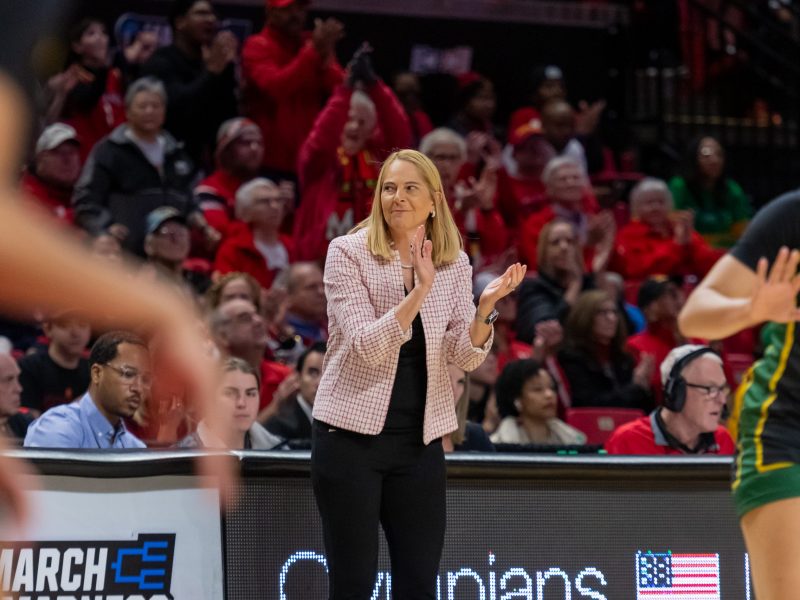In Brenda Frese’s first year at this university, every other page of the 2002-’03 Terrapin women’s basketball media guide featured a saying.
“The Beginning of a New Era.”
The Terps weren’t used to something like that, as there had only been two other coaches in the program’s history. For Frese, though, it wasn’t exactly the first time she was rebuilding a team to national prominence.
Frese, 35, who is now in her fourth year as head coach of the Terps, has coached at five Division I schools. She hasn’t spent more than four years in one place.
But along with a short tenure, there is something else common in her coaching career. Everywhere Frese goes, she wins. And she wins quickly.
From a recruiting coach at Kent State to head coach of the Terps, Frese has endured this successful journey at a young age. But with almost every success story, there’s hard work and struggles preceding the glory. A year-long stop in Minnesota included a life-changing experience, but Frese’s troubles began before she roamed the sidelines.
Early days
Prior to graduating from Arizona in 1993, Frese was a forward for the Wildcats before injuries cut her career short.
“I was really lost without basketball,” she said. “I didn’t know what I wanted to do.”
Frese was offered an assistant coaching job at Pima Community College in Tucson, Ariz. From there, her career took off. Because it was a community college where Frese was the only assistant, she did every last bit of dirty work.
“I recruited, I helped schedule, I actually even coached three games myself when I was there because the head coach also had another job that took her away for business,” Frese said. “So I just gained a ton of experience in one year that I wasn’t even expecting.”
Once Frese graduated from Arizona, she eventually made her way to Kent State as a recruiting coach. She spent two years with Kent State, which compiled a 37-18 record during her time there.
Then it was off to Iowa State, where her coaching career drastically improved. She spent four years as a recruiting coordinator under coach Bill Fennelly.
It was Fennelly’s first year at Iowa State as well, and the two took over a program that was coming off six straight losing seasons and picked to finish last in the Big 12 (at the time, the Big 8).
Over the next four years, the Cyclones made three NCAA tournament appearances, highlighted by an upset of Connecticut in the regional semifinals.
“That had a huge impact on my coaching career,” said Frese, who claimed Fennelly had the biggest impact on her coaching philosophy and career.
Frese left Iowa State in 1999 to pursue a head coaching opportunity at Ball State, a team that hadn’t had a winning season since 1990.
No problem for Frese. She coached the Cardinals to consecutive winning seasons and NCAA tournament appearances before taking off.
A Minnesota 360
Up next was the head coaching job at Minnesota in 2000-’01, where Frese’s life changed in more ways than even she could imagine.
“When we got there, we took over a team that was 8-20,” Frese said. “And it was the same identical roster coming back, except for the addition of a freshman that they had signed who was 50 pounds overweight and a transfer that had been sitting out.”
The Golden Gophers had a separate athletics department for the women, a separate gym they shared with the volleyball team and hardly any fan support.
“It was like having two separate schools almost,” Frese said. “The women, instead of the M [logo], they had branded Ms. - I kid you not. When we first got in there, our fans – it was our staff and our families and our kids’ families. You could count all 50 people in the gym and that’s what our fan base was.”
By season’s end, Frese was selling out the men’s arena.
“She turned it into a women’s basketball town,” said former Minnesota player Janel McCarville, now with the WNBA’s Charlotte Sting. “She was able to build a tradition.”
Aside from the fact Frese was taking over a program that was 29-81 the previous four years, there were also possible NCAA sanctions looming.
Minnesota investigated a situation in which they found that Frese’s predecessor, coach Cheryl Littlejohn, had paid a former player between $200 and $300, interfered with the university’s investigation into alleged NCAA violations and made players practice outside of NCAA-approved times.
Littlejohn was fired after the investigation and in came Frese – known as Brenda Oldfield before a divorce – who was determined to turn around a program in absolute disarray.
“I thought it was going to be a stretch of the talent that was there,” Frese said. “I wasn’t quite sold on how we were gonna get to turn it around. Obviously I changed my impression once I got in there and found out what kind of kids were in the program and how coachable they were, how hungry they were. I think the common thing you find out on any team you coach is you get to be around great kids.”
Frese earned the trust of her players, who were not afraid to get close to their new coach.
“You’re lucky if you get to play for her,” McCarville said. “She really builds up your confidence regardless of your talent level.”
McCarville said the team was “very close” and the players went out of their way to tell Frese about personal problems. In return, Frese went out of her way to build friendships off the basketball court.
And Frese’s coaching wasn’t too shabby, either. She started the year with Minnesota at 14-3 overall, slowly drawing fan support as the wins piled up.
Then came the game that put the Golden Gophers in the hearts of everyone around Minnesota.
“Early January one of our biggest games was we had to go to Wisconsin,” Frese said. “It was a sold out event, like 17,000 over in their arena and they were [No. 5] in the country. They started three seniors on their roster and we went in and upset them.”
The win put Minnesota in the top 25 for the first time since 1982.
In perhaps even better news, while Frese’s team was in Wisconsin, a water pipe broke, flooding the women basketball team’s arena floor.
Minnesota’s first game back home after the upset was going to be held in the Williams Arena, where the men played.
The result? A double-digit Gophers win and an attendance of 11,389, easily setting a Minnesota women’s basketball record.
“After that, we just exploded on the scene,” Frese said. “There was two competing newspapers there and they fought over front-page space for our women’s team because it was such a hot story. Myself and our team, we just blew up overnight.”
It was the atmosphere Frese dreamt of when she was hired.
The Golden Gophers finished the year 22-8 and Frese reeled in AP Coach of the Year honors. Minnesota, just like Frese’s career, had taken off.
But Frese was up to her old tricks. She left Minnesota after the one year to come to College Park, stunning fans and players of the team.
To make matters much worse, word spread that Frese was leaving before she had a chance to tell her players, who found out while watching television.
“We were awestruck,” McCarville said. “We thought it was an April Fool’s joke. A lot of players didn’t take it too well.”
McCarville said some of the players felt “betrayed,” but everyone was “heartbroken.”
“The program hadn’t expected anything like that,” she said. “I don’t think anybody expected her to do that.”
When Minnesota announced Frese was leaving, everyone was outraged. Student newspapers, local newspapers, national newspapers and sports radio all covered the move, and most took their parting shots. Fans and players were stunned, lashing out at Frese through the media.
“It was brutal,” Frese said. “Probably the hardest thing I’ve ever gone through professionally. The reason why I would say that is I was still pretty green as a coach. When you look at the fact that I had only been a head coach for three years – two years at Ball State where I could make a lot of mistakes and nobody knew. I wasn’t in the spotlight. And then at Minnesota, we were it. We were the new kid on the block.
“And then all of a sudden, you make a decision for your future and everyone just immediately turns on you. It was really hard.”
Frese said she received hate mail for about three to four months after she left. And to this day, she still gets word that when a Terp score is announced or shown at a Minnesota women’s basketball game, the arena boos.
“If we would have played Maryland at home, there wouldn’t have been one Terp fan,” McCarville said. “She would have been booed like no one’s ever been booed.”
Looking back on it, Frese still couldn’t believe how vicious the response was.
“I got a thicker skin now, but at the time I had never had anything ever written negatively about me,” Frese said. “They attacked my character, what kind of person I was, my integrity, everything. And it was tough. I mean I couldn’t believe how quickly they turned.”
Building her shell
Frese brought most of her coaching staff with her – assistant coaches Jeff Walz, Marsha Frese (her sister), Erica Floyd and Director of Basketball Operations Mark Pearson. It wasn’t easy to leave Minnesota, but Frese felt something had to be done to advance her career.
At the time, the players didn’t understand that. Now, McCarville said she and her former teammates understand Frese’s departure was simply a business decision. Frese has received e-mails and calls from players apologizing for the comments they made back then.
“I think the biggest factor was I had to think for the long term,” Frese said of the decision. “The goals that I had, the goals that Maryland had, Minnesota had – what meshed, what were more in place of each other. I guess the best way to describe it is my goals matched up probably perfectly with Maryland … at the time. [Athletic Director] Debbie Yow’s vision was identical to my vision.”
Yow played a big part in Frese’s decision to leave Minnesota and come to College Park (she was also heavily targeted by Ohio State). The year Frese was hired was the same year the Terp men’s basketball team won the national championship.
But when Yow was pursuing Frese, she never let the men’s team get in the way of her vision to get Frese on board.
“I thought that was pretty impressive,” Frese said. “It was like the men had their spotlight and oh, by the way, here’s our AP National Coach of the Year. She just had really great vision. It was pretty amazing.”
Another big reason Frese came to College Park to take over for the retired Chris Weller was recruiting.
The Terps had just finished building Comcast Center, and College Park was in a better part of the country for recruiting than Minnesota was. Frese would have an easier time selling her recruits on the facilities, location and weather.
Then came the time for Frese to turn around the Terps, who hadn’t been a national threat since the early ’90s. Luckily enough for Frese, she’s a fantastic recruiter who took advantage of every possible opportunity and still does.
“It’s 24/7,” she said. “For the most part, any day off we have, I’m out somewhere [recruiting].”
In her four years here, Frese has controlled the Washington and Maryland areas and scooped up high-school talent who may have looked elsewhere in the past.
“We used to feel pretty confident about getting a lot of the kids in D.C.,” Duke coach Gail Goestenkors said. “I think Brenda’s done a really good job of trying to own that state. It’s made it much more difficult.”
Frese, who said she has “a ton” of pride in her recruiting, has come away with top local talents, such as Kalika France, Marissa Coleman and Kristi Toliver.
But it was France and Shay Doron who got the resurgent Terps back on track.
Frese said the coaching staff had zeroed in on France and Doron when they first got to College Park. While other programs could offer a winning tradition or national championships, Frese had little to work with as far as past history went.
But, to Doron, it wasn’t about that; Frese had sold her on helping to turn the Terps into a national contender.
“I wanted that challenge,” said Doron, who chose the Terps over Duke and Harvard. “Nobody can come and feel the feeling we had when we were picked to finish eighth [in the ACC in 2004] and then got to the second round [of the NCAA tournament]. Not many teams or players get to feel that. I did. I wanted to go through that whole process. Start from scratch and see it grow with me here.”
After Doron and France came, so did more and more high school All-Americans. There’s now seven on this year’s roster.
In four years, the Terps have gone from a mediocre ACC team to a national title contender. Frese’s overall record with the Terps is 78-45. On Sunday, her team enters the NCAA tournament as a No. 2 seed, its highest seed since 1992.
“Coach B just had a dream to change this program around,” said Laura Harper, who passed up Connecticut to play for Frese. “She just made me feel like I was such an important part to her puzzle that she wanted to piece together, and I believed what she was saying to me.”
Frese has left her recruits with wins, national exposure and, most importantly, no regrets.
“I couldn’t be happier being here,” Coleman said. “I told Coach B the other day I couldn’t imagine myself with any other team, with any other coaching staff. I just love it here. I have so much fun. Definitely no regrets. I couldn’t see myself anywhere else – I’d be so unhappy.”
The tough part is complete from Frese’s end; she began a new era in Terp women’s basketball, just like she did everywhere else. But what would be truly different about this era comes from the program’s end – getting Frese to stay.
“Why would she leave here?” quipped Harper when asked if she thought Frese would leave. “She’s not gonna leave here.”
Contact reporter Andrew Zuckerman at zuckermandbk@gmail.com.


